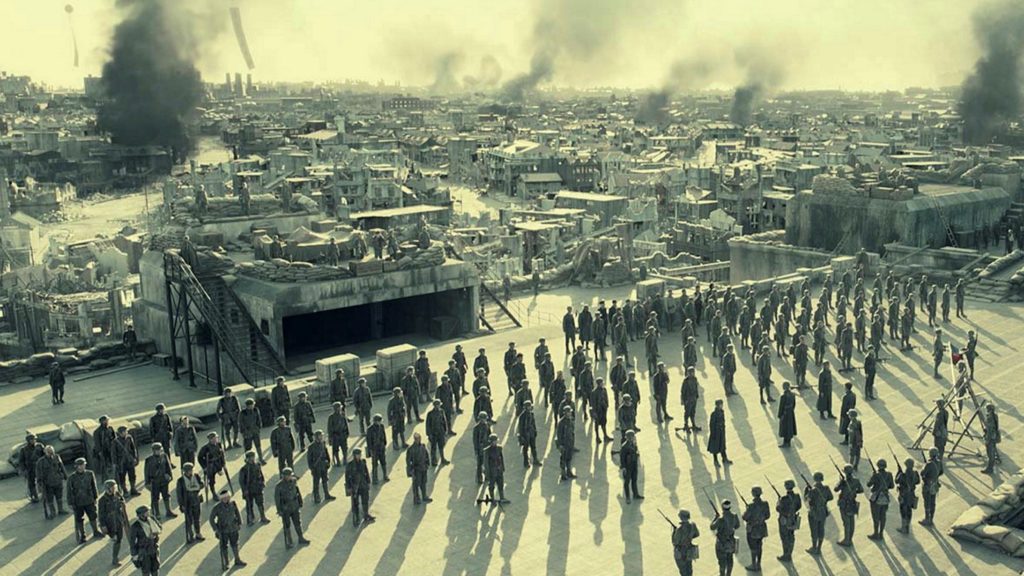2020 was a rough year for just about everything, but through the hardships The Eight Hundred managed to top the box office. Beating even Demon Slayer and Christopher Nolan’s Tenet for the spot. The Eight Hundred is a remarkable film, so why is no one talking about it?
Although it’s far from perfect it definitely got a lot of people talking. It’s a landmark for Chinese cinema as it marks the first time a non-Hollywood production has been crowned the highest grossing film of the year — a sign of a growing industry from this part of the globe.
The film is set in the Second-Sino Japanese War, a prelude to World War 2. The movie is titled after the lie in which Colonel Xie Jinyuan told reporters that they had 800 soldiers with them in order to mask their numbers from Japanese forces.

Now I know what you’re thinking, we’ve all seen our fair share of War films so how is this one any different?
Rather than facing Nazis in the streets of Europe or fighting the Japanese navy on remote islands in the Pacific, this film is about Chinese soldiers defending their country from the invading Japanese army right in front of their fellow countrymen right across the creek.
As the Japanese go on with their conquest of China, the Republic sends its best unit, the 88th Division, to defend Shanghai. After just 3 months of fighting, China has lost more than 100,000 soldiers and the army decides to retreat, leaving only a small force of 452 soldiers to take their last stand against the enemy.
The forces led by Colonel Xie Jinyuan were told to hole up in the Sihang Warehouse across the creek from the International District, a neutral zone in which the foreign powers had their embassies and businesses. Their mission was to hold Shanghai for as long as they can; to make a show for the world – to send the message that China was still fighting and needed support.
Now before we go any further, let’s get the elephant in the room out of the way. Chinese films tend to have a track record of not being that great. There’s this stereotype of them being either really cheesy and a bit over the top with theatrics. Their war films especially tend to be too patriotic to the point that it comes off as propaganda.
However, The Eight Hundred sets itself apart from the campy tropes of Chinese cinema. The actors all make convincing performances as if they were really there fighting for their lives. The special effects are well executed and never look out of place. There is also no glorification of death, no demonization of the Japanese army – this trait of the movie makes it feel more human and realistic.
It’s not often you get to see people trying to desert the battlefield, scared soldiers hiding from the combat, men infighting and teenagers forced to fight. There are no Johnny Rambos in this film, just your average Joes shoved into an unfortunate situation. Their heroics don’t come from feats like cutting down waves of soldiers like grass, but the sacrifices they make.
The film excels in its portrayal of everyday people in such a terrible situation. The movie never fails to show you the desperation of the situation, and you just can’t help but sympathize. There are a few scenes in the movie that can genuinely make you tear up.
Its story of unconventional heroism and hopes for peace should resonate with just about anyone. For fans of war movies and Asian cinema, it is definitely a must watch.
POP! Creator Community/Viking Ulanday
________
DISCLAIMER: All views and opinions expressed in this post are solely those of the contributor/s and do not represent those of InqPOP! and INQUIRER.net. The InqPOP! staff assumes no liability for any error in the content of this material. Got something you want to share to the world? Get a chance to publish your awesome creations and share it to the world through our InqPOP! Creator Community program. Send us your stories, videos, photos, fan fic, and even fan art at pop@inquirer.net
For more details, read the POP! Creators FAQ page.